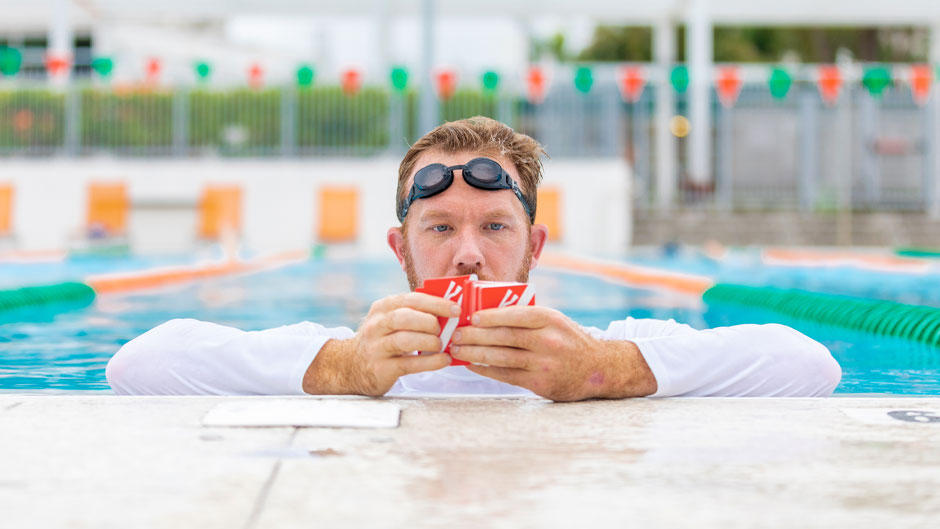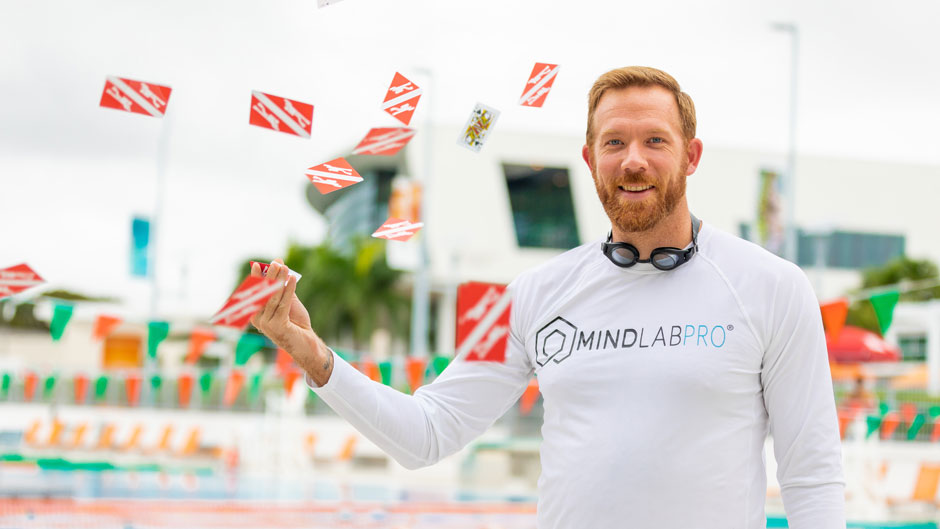If Dos Equis beer is looking for the next “most interesting man in the world” for its next commercial, the company does not need to look any further than Nelson Dellis.
Dellis, a memory champion, world-traveling mountaineer, author, and now Guinness World Records holder, started his journey to become a memory guru in 2009 when his grandmother passed away of Alzheimer's disease.
“I never really thought anything about my memory, or memory in general, until I saw hers deteriorate,” Dellis, a double alumnus and lecturer in the Department of Computer Science at the University of Miami, said. “When she passed away, I was worried for myself.”
Dellis quickly got to work researching ways to keep his brain sharp. That’s when he discovered the USA Memory Championship.
"I was baffled and wowed by what these competitors were doing. They were memorizing decks of playing cards, hundreds of numbers, and names—something I could never do," he said. "You discover very quickly in these competitions that it's all training."
So, Dellis dipped into the world of competitive memory games. Memorizing decks of cards, number sequences, and names, Dellis began competing for USA Memory Championship titles. Since then, he earned the title four times between 2011 and 2015, and his fifth title just two weeks ago. Dellis is also one of just 154 people globally who holds the elite Grandmaster of Memory title. The accolade requires competitors to memorize 1,000 random digits in an hour, the order of 10 decks of shuffled cards in an hour, and the order of one deck of shuffled cards in under two minutes.
Additionally, Dellis holds individual U.S. records for memorizing the most names, words, digits, and playing cards in a window of time. In just 15 minutes, he can recite more than 230 names mentioned to him just once. Present him with nine decks of shuffled cards, and in just 30 minutes, he can read them back to you in the exact order that they were presented.
Despite his many achievements, he was still vying for one title—to be listed in Guinness World Records.
On Nov. 13 at the University Center pool, Dellis broke the record for the fastest time to arrange a deck of playing cards memorized underwater. Using waterproof playing cards, Dellis sank to the bottom of the pool to study a randomized deck of cards. After resurfacing, he placed that deck on the table face down, then arranged a new deck in that same order. Dellis spent weeks leading up to the record attempt training his endurance underwater for the occasion.
 Previously standing at 3 minutes and 42 seconds, Dellis now holds the title at 2 minutes and 22 seconds. During the event, Dellis also attempted to break the record for the greatest number of cards memorized while underwater but didn’t succeed. The record is currently 67 cards.
Previously standing at 3 minutes and 42 seconds, Dellis now holds the title at 2 minutes and 22 seconds. During the event, Dellis also attempted to break the record for the greatest number of cards memorized while underwater but didn’t succeed. The record is currently 67 cards.
"I was really happy to get that Guinness World Records title," he said. "I wanted that second record. I might try again in a year, but I was happy to break that first one."
Though the record attempt started as a personal goal, Dellis said the decision to make the record attempt in November, annually recognized as National Alzheimer's Awareness Month, was intentional. As founder and CEO of Climb For Memory, a nonprofit charity that aims to raise awareness and funds for Alzheimer's disease research, Dellis hopes to educate people on the significance of strengthening your body both mentally and physically. He notes that through various mental exercises, training, and techniques, anyone can be a memory whiz.
"When I started, I tried to learn the techniques to see if I can do it. And low and behold, I can, and so can anybody," he said. "I just took it to the next level and trained obsessively for months and years using these techniques."
When trying to memorize a shuffled deck of cards, Dellis uses a method memory champions refer to as “a memory palace.”
"What I'm doing is using techniques that take information and turn it into imagery in my mind," he said.
The process is simple. Close your eyes and imagine a place that is familiar to you. Paint the location in your mind in vivid detail, taking note of the layout of each room and place. Now, imagine a path along the route of your location. Dellis uses this dreamscape method to memorize sequences, like randomized decks of cards. By associating people with each suit, he pictures them along the path.
While challenging, testing the limits of his memory through memory competitions, Dellis decided it wasn't enough to keep his brain active. In addition to his quest for cognitive greatness, he is an experienced mountaineer. He has climbed numerous peaks around the world, even attempting to summit Mount Everest four times.
"Mountaineering is also really mental. I like to push myself to the limits, and I just saw it as another avenue to challenge myself," Dellis said. His expeditions support his nonprofit business to raise awareness and money for Alzheimer's disease research. "I like that feeling that you don't have to be the strongest, the fittest, or the most mentally strong to get to the top of the mountain. I've done this with my memory too, but timing, training, and hard work ended up giving me the win."
So, what's left for Dellis to conquer? Despite his many achievements, records, and expeditions, the memory champion has set sights on setting a few more records, like memorizing the most numbers of pi (which is now in the trillions). Still, Dellis' mission remains to educate people on the importance, and ability, to train your brain.
“Part of the reason that I like what I do is that I like teaching about it, too,” Dellis said. “Anybody can do this. It’s just a matter of using these tricks and techniques. It’s so easy these days to be distracted and rely on your devices, which just makes your memory atrophy. The best way to get a better memory is to force yourself to use it.”

